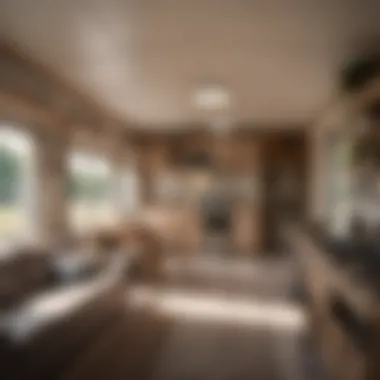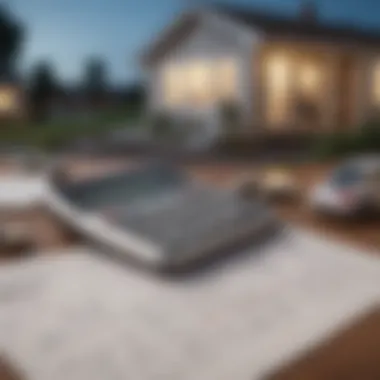Mobile Homes on Private Lots: Pros, Cons & Insights


Intro
Mobile homes on private lots present an exciting yet complex option for housing. This avenue attracts many individuals who seek more flexibility and control compared to traditional homeownership. The decision to place a mobile home on a private lot is not merely guided by personal preference; it involves a deep understanding of legal, financial, and lifestyle factors.
This article aims to provide a thorough exploration of the intricacies concerning mobile homes positioned on private property. By examining these aspects, potential homeowners can navigate their paths towards informed decision-making.
Understanding Mobile Homes
Understanding mobile homes is essential when considering placing them on private lots. These homes represent an alternative housing option that caters to a diverse range of individuals and families. When examining mobile homes, it is crucial to consider affordability, design flexibility, and dynamic living options that can suit different lifestyles.
Mobile homes come in different forms and adaptations, making them suitable for various placements and uses. They may serve as permanent residences, vacation homes, or investment properties. This flexibility offers real solutions to affordable housing shortages in some regions, especially when conventional real estate prices can be prohibitively high.
Definition and Types
Mobile homes, typically known as either manufactured homes or trailers, come in various types, each designed to fulfill specific needs and preferences. Most often, terminals like “single-wide” or “double-wide” describe the width of the home, with sizes and designs that range from basic structures to more elaborate, spacious accommodations.
- Single-Wide: These are usually smaller, with dimensions around 12 to 18 feet wide, allowing for quicker deployment and scalability in terms of location.
- Double-Wide: As the name suggests, these homes are larger, set up by connecting two single units, offering more square footage and options for interior layouts.
Mobile homes can also be classified according to the features they include, such as eco-friendly designs, customizable layouts, or luxury models. The choice depends on the homeowner’s priorities, budget, and aesthetic preferences.
Historical Context
The historical context of mobile homes is intricately tied to shifts in population and economic trends. Initially crafted for ease of transport during the post-war era, mobile homes became synonymous with affordable living solutions. Over time, advancements in building materials and technology have had a significant effect on their evolution.
- 1940s: Mobile homes emerged to meet the urgent housing demand in a post-World War II environment, offering families quick and flexible living arrangements.
- 1976 and Beyond: The introduction of the HUD code set precise regulations to ensure safety and quality. This provided a benchmark, reassuring buyers about the standards of mobile homes.
Consequently, mobile homes have transitioned from merely serves as moving accommodations to a viable option for long-term housing solutions. It is invaluable to reognize these shifts to fully grasp the implications of selecting mobile homes on private lots today.
The Concept of Private Lots
The idea of private lots is central to understanding the placement and living within mobile homes. For potential homeowners, these lots offer opportunities that vary significantly from traditional housing markets. In this context, the concept of private lots includes their definitions, legal prescripts, and the environmental continuums they inherently provide. Understanding private lots lays a critical foundation for decisions related to zoning, land use rights, and property management.
Definition of Private Lots
Private lots refer to parcels of land owned by individuals or entities where families can position their mobile homes. These distinct plots can vary in size, location, and utility. Ownership of such land imposes certain responsibilities, but it can also allow for greater personalization and autonomy in residence.
- Private lots can comprise various property types, including rural estates and urban fringes.
- They usually feature defined boundaries and may come with established facilities.
- Homeowners may choose to install utilities instead of relying on communal services, promoting independence.
In essence, private lots stand as isolated home stands that deliver both personalization and investment potential without some restrictions often tied to manufactured home parks or neighborhoods.
Zoning Regulations
Navigating the maze of zoning regulations becomes paramount when exploring private lots for mobile homes. These regulations serve as legal frameworks governing land use, ensuring safety and harmony within communities.
Zoning laws dictate where residential structures, including mobile homes, can be situated. Ignoring them can lead to displacement or legal objections.
Key aspects of zoning regulations include:
- Permitted Uses: Not all private lots allow for mobile home installation. Zoning decide welcomes or forbids these homes based on local guidelines. Carefully assess which uses the property permits by contacting local authorities.
- Setback Requirements: Most zones establish limitations regarding how close buildings may be to property boundaries. These regulations aim to maintain safety, aesthetics, and density controls.
- Land Use Categories: Lot usage can be categorized as residential, commercial, or mixed, affecting mobile home placements.
It's essential to conduct thorough due diligence on zoning assists before purchasing.
For those interested in learning more about zoning laws, resources such as Wikipedia provide frequently updated information.
Legal Considerations
Understanding the legal considerations for mobile homes on private lots is essential for any potential homeowner. Navigating the complex web of regulations can considerably influence your investment. Homeowners must be aware of their rights and responsibilities regarding land ownership, building codes, and the permitting process.


Land Ownership and Rights
When placing a mobile home on a private lot, it's crucial to first decipher land ownership rules. Owning the land is desirable. It grants more control over your property and minimizes resistance from potential landlords. In many cases, if the land is leased, read the lease agreement carefully. Identify any stipulations surrounding the mobile home. The rights of the homeowner must be aligned with local laws and zoning regulations. Failure to adhere could result in penalties or eviction.
Additionally, understanding property deeds is vital. Ensure the title for the land supports mobile home installation. Different states and localities might impose regulations about how property can be utilized. Knowing this protects you from future disputes and lawsuits, reaffirming your investment.
Building Codes and Compliance
Local building codes govern the installation of mobile homes. These determine what is permissible in construction and setup. Key elements include ensuring structural integrity and safety standards. Before installing, consult the local zoning office for information on relevant codes. Compliance guarantees the mobile dwelling meets safety standards. This is especially important when it comes to the foundation, plumbing, and electrical systems.
Ignoring these codes can lead to costly fines and condemnation of the mobile structure. Remember that adhering to these guidelines also increases the property's value, appealing more to future buyers.
Permitting Process
Securing the necessary permits is a critical step before moving forward with your mobile home project. The process will vary widely by location, making it essential to engage with local government offices. General risks may include construction fines if permits are not secured prior to initiating setup.
Typically, you will need to present detailed plans that comply with zoning regulations. Submitting the correct documentation supports acquiescence in permitting. Bloated documentation or incorrect submissions can delay your project significantly.
Furthermore, staying proactive in communication with permitting offices can prevent pitfalls. Be aware that not securing the relevant permits blocks the sale or refinance of the property down the line, expending resources unnecessarily. Updating knowledge on what documents expedite the process creates an informed perspective. .
Legal due diligence plays a vital role in ensuring a smooth transition into mobile home living on private lots.
In summary, prospective homeowners should prioritize understanding the intricacies of legal considerations. Grasping land ownership rights, local building codes, and the permitting process streamlines the decision to invest. Making educated choices enhances security and shares a vision of successful mobile home placement.
Financial Implications
Examining the financial implications of mobile homes on private lots is essential for a comprehensive understanding of this housing choice. Families and individuals considering this option must consider various elements like the purchase cost, financing methods, and required insurance. These factors deeply impact not just immediate affordability but long-term financial health.
Cost of Mobile Homes
The cost of mobile homes varies widely depending on several factors. New mobile homes usually range in price based on size, design, and customizations. On average, one might expect to pay from $50,000 to $100,000 for a standard model. Used mobile homes can be considerably cheaper, averaging around $20,000 to $80,000, depending on age and condition. Keep these factors in mind:
- Upfront Costs: Include purchase prices, initial setup, and possible land costs. This can add thousands to the investment.
- Ongoing Expenses: Monthly utilities, maintenance, and property taxes must be tracked closely.
Ultimately, knowing the entire initial investment alongside ongoing expenses is vital for budgeting effectively.
Financing Options
When buying a mobile home, several financing options exist. Traditional bank financing might not cover mobile home loans, since many lenders see them as personal property rather than real estate. Here are some popular options:
- Chattel Loans: These loans are specifically for mobile homes. They don't require the property to be fixed to a permanent foundation.
- FHA Title I Loans: These are backed by the Federal Housing Administration. They can be a path for individuals with lower credit scores.
- Personal Loans: Sometimes taking a personal loan can fill gaps, but expect higher interest rates and stricter repayment terms.
It's wise to shop around and research lenders that understand the unique situation of a mobile home buyer. Understanding loan terms is critical to sustaining financial health in the long term.
Insurance Considerations
Insuring a mobile home placed on private lots involves additional considerations, unlike traditional homes. Insurance types tend to be adapted for added risk scenarios. Here are some things to weigh:
- Standard Homeowners Insurance: Often harder to secure for mobile homes. Special coverage for structures, personal property, and liability is crucial.
- Mobile Home Insurance: This coverage can include accidental damage, theft, and liability but differs based on conditions.
- Flood Insurance: If the lot is in a flood-prone area, this coverage can be critical even if your homeowner policy doesn't cover it.
Having comprehensive insurance will protect your investment, aligning with the various financial implications that come with owning a mobile home.
Cost management through proper financing and insurance is not merely about expense tracking. These factors should form the bedrock of strategic financial decisions affecting the overall lifestyle choice of mobile home ownership.
Advantages of Mobile Homes on Private Lots
Mobile homes placed on private lots hold numerous advantages that appeal to a wide range of homeowners. The broad notion of affordability coupled with the freedom to customize makes mobile homes an appealing choice. This section will delve into these benefits, focusing on affordability, design flexibility, and potential for appreciation in value.
Affordability


The first critical advantage of mobile homes on private lots is affordability. Traditional homes often come with high price tags alongside significant long-term financial commitments. In contrast, mobile homes generally involve lower upfront costs. For aspiring homeowners, emergency finding options and grant programs can assist with buying a mobile structure in many areas.
Additionally, private lots typically have reduced utility and land taxes when compared to traditionally built homes planted in urban sprawling testosterone of municipalities. Also, homeowners can save on associated costs by being able to choose the plot location. Purchasing a private lot in a less-developed area drastically reduces expenses.
A sturdy mobile home can be economical to heat and cool, thanks to modern energy-efficient technologies. The average energy consumption of mobile homes has decreased, providing further expansion on long-term affordability. Poor-credit individuals seeking homeownership might find mobile homes a worthy option.
Research shows, on average, mortgage payments for mobile homes are significantly less than those for traditional homes.
Design Flexibility
Another prominent advantage is design flexibility. Many buyers appreciate in customizing their living spaces according to personal style and preferences without falling under the strict regulations found in traditional neighborhoods.
When placing mobile homes on a personal lot, owners have the scaling in many aspects. They may alter outdoor landscaping, construct decks, or create gardening spaces at their own comfort. Internally, people can enhance the layout or modify cabins, making any mobile sanctuary changeable and adaptable. OODS containment options in material, size, and color make homes beyond cookie-cutter conformations.
This flexibility has made mobile homes appealing to families, retirees, eco-conscious individuals, and professionals yearning for unique living solutions. Homeownership dreamsin personal residences are punctuated by the numerous finding available for mobile plants projects.i d
Potential for Appreciation
Lastly, aiming towards the potential for appreciation in value adds to the merits of owning mobile homes on private lots. While's common consensus, mobile homes might suffer depreciation, the opportunity is prevalent for increase in value when thoughtful purchases select an appealing plot.
It's essential to remember that the location plays a prime role. A mobile home parked on a well-located lot can appreciate just as much as traditional homes. Additionally, thoughtful renovations and adequate msntained impwove values, attracting buyers drawn toward eco-features.
In hforder to fully actualize owndership profile ol a mobile home’s asset, pursuits of higher credit ***** banks pressures result in direct value afterward purchases:aesthetic success carries the histórico correquired rate.compelling evidence exists for people observing places where demand influx exist, initiating re-evaluation patterns calmly.
While potential appreciation dynamics can differ, connecting communities serve to strength جبکہ holds of sound solutions lending feasible homeownership paths willingly.
In summary, the advantages of mobile homes on private lots broadly span financial savings, freedom in creation, and future potential rise in equity. Whether one desires cost-efficiency or personalized comfort, mobile homes fit criteria appealing to stakeholders done vicinity shifting landscapes curated periodsall-infusions gen gastronomized.wallet.utilizingi dry obtained courage payable systems thriving street’s horizons".
Challenges and Considerations
Challenges and considerations regarding mobile homes on private lots encompass factors that homeowners must understand before diving into this lifestyle. These factors can significantly influence decisions about investment, living quality, and long-term plans. While mobile homes often attract potential homeowners with affordable pricing, various inherent issues can arise.
Resale Value Concerns
One of the primary worries for individuals considering mobile homes is the resale value. Unlike traditional homes, mobile homes can depreciate rapidly. Over time, wear and tear from the elements or poorly maintained conditions can lower their value even more.
Drop in demand for mobile homes in given areas, especially in prestigious neighborhoods, further emphasizes this risk. Tagging an appropriate price can be challenging because of competing listings. It is helpful to evaluate local market conditions and exit possibilities before making a purchase. A thorough market assessment could help minimize future profitability loss.
Maintenance and Upkeep
The ongoing upkeep of a mobile home can be substantial. Basic maintenance tasks, like plumbing and HVAC systems, may require specific care, especially Mobile homes what often are in various locations. Inefficient maintenance can lead to larger problems over time, attracting unnecessary and sometimes crippling repair costs for the homeowner.
Structural integrity is also essential. Checking for leaks and ensuring proper insulation is Critical. Inspection practices should be established to monitor common wear issues. Planning for routine checks and budgeting accordingly can alleviate majority of the standard concerns regarding upkeep.
Community Restrictions
In many cases, setting mobile homes on private lots may come encumbered with community restrictions. These limitations can pertain to everything from the type of home to settle to specific zoning requirements. Each community has different rules, which necessitates thorough research well before the buy.
Neighborhood associations might impose regulations that affect aesthetic and maintenance practices. Restrictive covenants may put emphasis on maintaining a clean, uniform appearance across the development. These considerations must align with the homeowner’s later vision and lifestyle.
Understanding community restrictions plays a crucial role in ensuring that mobile home ownership aligns with personal goals and complies with existing local regulations.
Prioritizing sustainability could also lead individuals toward eco-friendly practices, but these can face upfront logistical hurdles dependent on gathered guidelines or sleeping covenants.
Acknowledging analyze these concerns upfront will prepare potential homeowners for the distinct opportunities and factors they will face when exploring options available for mobile homes on private lots.
Lifestyle Implications


Understanding lifestyle implications is important for anyone considering a mobile home on a private lot. This choice does not only affect living conditions but also the social interactions, privacy, and overall sense of independence a buyer may experience.
Community Dynamics
Community dynamics can largely define the living experience of mobile home residents. When placing a mobile home on a private lot, the surrounding neighborhood plays a vital role in shaping day-to-day life. It is crucial to consider the existing community elements before finalizing a purchase.
- Neighborhood character: The area may be rural, suburban, or urban. Each offers unique benefits. In rural settings, peace and quiet often reign. In urban areas, convenience is key.
- Social interactions: Residents may or may not have frequent contact with neighbors. Friendly neighbors contribute to a supportive environment. On the other hand, less social interaction may offer a quieter lifestyle.
- Community involvement: Participating in local events can enhance a feeling of belonging. It provides an additional layer of lifestyle that some may find appealing.
Collectively, these factors impact how one feels in a mobile home on a private lot, influencing both happiness and comfort level.
Privacy and Independence
Privacy and independence rank high on the priority list for many mobile home owners. This housing option frequently offers greater autonomy compared to traditional homes or apartments.
- Space and layout: Customizing space fosters a sense of ownership. Layouts on private lots can be unique, catering to the resident's lifestyle. This customization often leads to a more satisfactory living environment.
- Reduced regulations: Living on a private lot typically brings fewer restrictions. Consequently, residents can enjoy more freedom regarding property modifications, yard design, and outdoor activities.
- Personalized retreat: The capacity to create a personalized haven contributes significantly to mental well-being. Individuals can structure their un-naastural lives without the constraints sometimes seen in planned communities.
Privacy amplifies the sense of indepenednce in a personal retreat. Choosing a mobile home on a private lot empowers owners to shape their lifestyle.
Sustainability and Environmental Impact
Sustainability in context with mobile homes placed on private lots is a vital consideration for modern homeowners. As people become more conscious of their environmental footprint, evaluating how mobile homes can fit into sustainable living practices is essential. Mobile homes can offer various benefits regarding sustainability, but it is paramount to analyze these factors deeply.
One of the distinctive advantages of mobile homes is their smaller size compared to traditional houses. This smaller footprint can lead to reduced resource consumption during construction, transportation, and ongoing utility usage. Many mobile homes, particularly newer models, integrate energy-efficient materials which lower heating and cooling costs.
Energy Efficiency Considerations
Mobile homes are increasingly designed with energy efficiency in mind. Features like additional insulation, Energy Star-rated appliances, and energy-saving windows can significantly decrease energy consumption. This is essential as homeowners on private lots might face increased utility costs and environmental responsibility.
Several options exist to boost energy efficiency in mobile homes:
- Insulation Improvements: Upgrading insulation, particularly in walls and ceilings, prevents heat loss in winter and keeps the home cooler in summer.
- Renewable Energy Sources: Installing solar panels enables homeowners to generate their own electricity, reducing reliance on fossil fuels.
- Water Conservation Devices: Low-flow showerheads, faucets, and drought-resistant landscaping reduce water waste, contributing to a more sustainable lifestyle.
By focusing on these elements, mobile homes can align with broader sustainability goals effectively.
Land Use Insights
The placement of mobile homes on private lots can challenge traditional land use patterns, promoting more diverse community configurations. These configurations respect open spaces and neighborhood character while encouraging house diversity.
When deciding on land use regarding mobile homes, consider these factors:
- Local Zoning Laws: Many regions have specific regulations that dictate land use and home placement. Understanding these regulations ensures compliance and helps integrate the home into the surroundings.
- Environmental Footprint: It's important to minimize disruption to local flora and fauna when setting up a mobile home. Respecting natural landscapes can bolster biodiversity.
- Waste Management: Proper systems should be instituted for waste disposal to avoid environmental hazards. Mobil homes benefit from utilizing central waste facilities while fostering connections to community services.
Overall, mindful choices in land use contribute positively to the sustainability narrative surrounding mobile homes. By thinking carefully about energy use and land development practices, property owners can lead in ecological consciousness while enjoying the benefits of mobile home living.
Future Trends in Mobile Homes
Understanding the future trends in mobile homes holds significance, particularly for individuals contemplating life on a private lot. While mobile homes offer unique advantages, the evolution of design and technology could further enhance their appeal. Growing societal awareness about sustainability, along with a shift in lifestyle choices, plays an important role in invigorating interest in mobile home living. More people expect innovative solutions and adaptability that cater to personalized needs and environmental responsibility.
Innovations in Design and Technology
Innovations in design and technology are reshaping mobile homes, making them more appealing to potential buyers. The focus has shifted to multi-functional spaces, allowing homeowners to maximize the use of their limited square footage. Here are key elements:
- Prefabrication Techniques: Advances in prefabrication minimize construction time. Homes built in factories can reduce waste and even energy consumption during construction.
- Smart Home Integration: High-tech features are now common. Devices such as smart thermostats, security cameras, and energy management systems integrate seamlessly, enhancing living quality and security.
- Eco-Friendly Materials: Sustainable construction materials such as bamboo flooring and recycled steel are being adopted more widely. Choosing eco-friendly options reduces a home's overall environmental impact.
This intersection of innovation creates opportunities that align with both modern sensibilities and environmental mindfulness.
Changing Perceptions of Mobile Home Living
Over the years, perceptions of mobile homes have evolved significantly. Once considered temporary housing, many now view them as viable, permanent solutions. Factors promoting this shift include:
- Quality and Design Appreciation: Today’s mobile homes frequently match the quality found in traditional homes. Customizations can give them a unique - yet elegant - touch.
- Demographic Changes: Younger generations seek affordable, flexible housing solutions. They often prioritize experiences over possessions, making mobile living an appealing option.
- Marketing Advances: Mainly due to social media platforms, lifestyles centered around unique mobile living situations are shared more widely. Expanding accessibility to aesthetics and services has redefined how mobile homes are presented in society.
By revealing transformative trends within mobile homes, it is feasible to understand the seduction they hold in modern real estate discussions.
As homebuyers and economic conditions fluctuate, mobile homes are well-positioned for future growth. The connectedness of innovations to sustainable lifestyles promotes unique opportunities to prospective homeowners.







